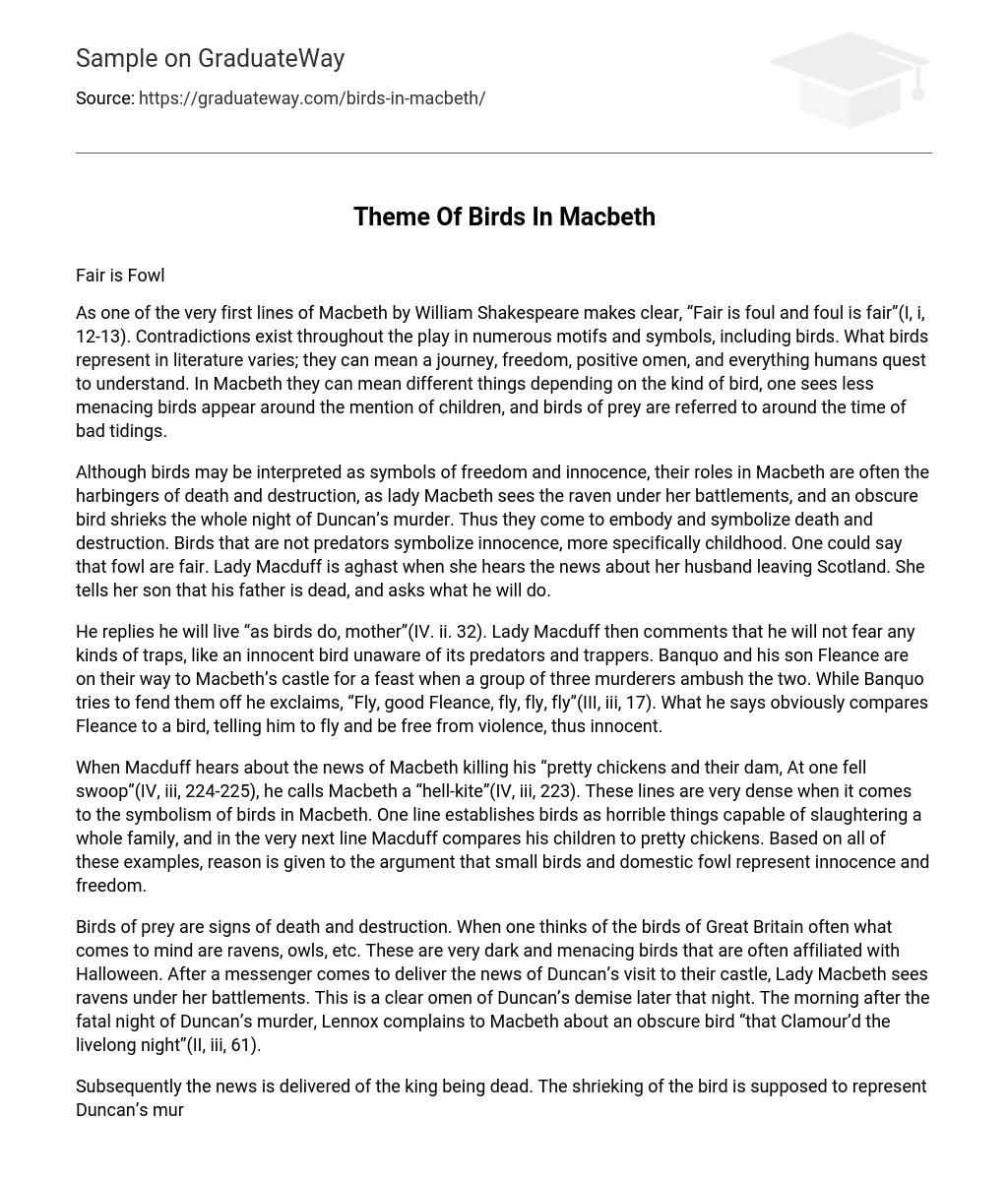Fair is Fowl
According to the opening lines of Macbeth by William Shakespeare, “Fair is foul and foul is fair” (I, i, 12-13), contradictions are prevalent in the play through various motifs and symbols. Among these symbols are the birds, which hold different meanings in literature, including representing a journey, freedom, positive omens, and the mysteries of human quest. In Macbeth, the interpretation of birds depends on their type – less threatening birds are associated with children, while birds of prey are mentioned during times of misfortune.
Although birds may symbolize freedom and innocence, in Macbeth they often serve as omens of death and destruction. For instance, Lady Macbeth observes a raven under her battlements and an unknown bird cries throughout the night of Duncan’s murder. These birds come to represent and embody death and destruction. On the other hand, birds that are not predators symbolize innocence, particularly childhood. In this sense, one could say that fowl are fair. Lady Macduff is horrified when she receives news of her husband leaving Scotland. She informs her son that his father has died and asks him how he will cope.
He replies he will live “as birds do, mother” (IV. ii. 32). Lady Macduff then observes that he will not fear any traps, like an innocent bird unaware of its predators and trappers. Banquo and his son Fleance are on their way to Macbeth’s castle for a feast when a group of three murderers ambush the two. While Banquo tries to defend them off, he exclaims, “Fly, good Fleance, fly, fly, fly” (III, iii, 17). What he says clearly compares Fleance to a bird, urging him to fly and escape violence, thus remaining innocent.
When Macduff hears about the news of Macbeth killing his “pretty chickens and their dam, At one fell swoop”(IV, iii, 224-225), he refers to Macbeth as a “hell-kite”(IV, iii, 223). These lines contain dense symbolism of birds in Macbeth. One line portrays birds as dreadful creatures capable of massacring an entire family, while in the very next line Macduff likens his children to pretty chickens. These examples support the argument that small birds and domestic fowl symbolize innocence and freedom.
Birds of prey, such as ravens and owls, are often associated with death and destruction in Great Britain. Lady Macbeth, after receiving news of Duncan’s visit to their castle, witnesses ravens lurking under her battlements, foreshadowing Duncan’s imminent demise. The morning following Duncan’s murder, Lennox laments about a mysterious bird that made noise throughout the entire night (II, iii, 61).
The news of the king’s death is subsequently delivered. It is believed that the shrieking of the bird represents Duncan’s murder, as they both occur at the same time. Additionally, on that same night, an old man witnesses an owl killing a hawk in mid-flight, symbolizing the king’s death (the hawk) at the hands of Macbeth (the owl). When Macbeth sees Banquo’s ghost during his own feast, his wife attempts to reason with him, but he responds with, “If charnel-houses and our graves must send Those that we bury back, our monuments Shall be the maws of kites” (IV, iii, 70-72).
The text emphasizes that if graves cannot contain the deceased, people must resort to placing their dead in the bellies of birds. This evidence suggests that the presence of flying creatures signifies death and devastation in Macbeth. Birds of a non-carnivorous nature symbolize innocence and the unrestrained nature of childhood, while predatory birds embody ruin. Several older characters in the play draw comparisons between children and birds, as well as liken Macbeth to a bird of prey. In literature, avian creatures can represent positive omens, negative omens, freedom, demise, triumph, and more. The multifaceted interpretations of birds exemplify the numerous contradictions within Macbeth’s text.





